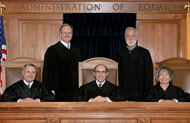6/30/2008
New Mexico Supreme Court OKs Seizing Cars from AccusedNew Mexico Supreme Court ruling allows Albuquerque to begin seizing automobiles from motorists not convicted of any crime.

The New Mexico Supreme Court on Friday gave the city of Albuquerque the green light to begin confiscating automobiles from motorists not necessarily convicted of any crime. The court's unanimous ruling did not defend the merits of Albuquerque's controversial program. Instead, the justices declined to intervene before the city had taken any cars from drivers accused for the first time of driving under the influence of alcohol (DUI).
"At least as a matter of judicial policy if not of jurisdictional necessity, our courts have generally required that a litigant demonstrate injury in fact, causation, and redressability to invoke the court's authority to decide the merits of a case," Justice Richard C. Bosson wrote for the court.
The controversy began in 2005 when the Albuquerque City Council announced that it would take cars away from anyone arrested for DUI, even from those who have never before been convicted of any offense, as a way to raise $300,000 in annual revenue. The American Civil Liberties Union of New Mexico quickly filed suit to stop the program on constitutional grounds, arguing that it would impose a punishment based upon arrest, not upon an independent finding of guilt by a court of law or jury. The organization suggested that the program placed all drivers in the city at risk.
"Since it is not illegal to drive a vehicle or to drink before driving a vehicle, so long as the driver's blood alcohol concentration is within statutory limits, the ordinance potentially subjects drivers who drink, but are not intoxicated under our laws, to the threat of forfeiture of the vehicle that they are driving," the court summarized.
A trial court agreed with the ACLU that Albuquerque had set up procedures that violated constitutional due process protections, but the state appeals court rejected the ACLU's right to challenge the city ordinance. The state supreme court sided with the appellate judges in concluding that the harm claimed by the ACLU was too speculative. The court would not overturn an ordinance simply because it might be abused.
"If it turns out that the city does, in fact, seize and forfeit a vehicle based solely on probable cause for the arrest, regardless of whether the owner is ever convicted of DWI, then that vehicle owner will have the concrete injury, the motive, and -- given the ACLU's willingness to intervene -- the opportunity to mount an effective challenge to the ordinance," Bosson concluded. "The issues raised by plaintiffs, though certainly serious and of constitutional magnitude, involve questions of due process that are best addressed in the context of a specific case after enforcement of the ordinance."
The decision clears away all prior injunctions that had prevented the city from starting its confiscation program.


